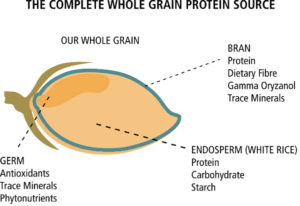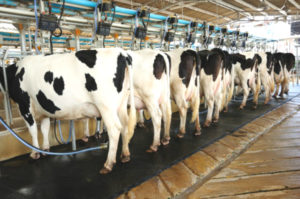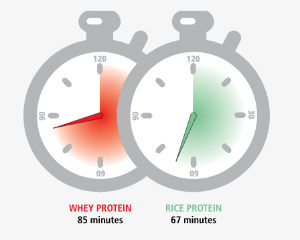 For starters, the problem we face with nutrition and supplementation is marketing hype, where companies aim to sell their supplements based on limited or incorrect information.
For starters, the problem we face with nutrition and supplementation is marketing hype, where companies aim to sell their supplements based on limited or incorrect information.
This leaves us with ‘pop-up’ manufacturers promoting propaganda based on false scientific research. This often puts our health at risk just to sell a supplement.
On top of this confusion, building and maintaining muscle can be a hard and long process. But what’s more difficult is deciding on how to structure our diet.
We’re always asking ourselves; “What supplement will promote the best muscle building (or maintaining) benefits?”.
For years now, we’ve been bombarded with advertising that promotes milk-derived whey protein as the most potent muscle building formula. However, new research proves otherwise.
Research shows that ‘organic brown rice protein’ may hold the answers that we’ve been looking for. Continue reading to discover more…
 About this comparison: To make this comparison fair, I’ve compared Oryzatein®, which is a world-leading organic brown rice protein featured in the Journal of Nutrition and Health Sciences. And then I’ve used whey protein – which is well studied, and it’s been in mass production for many years.
About this comparison: To make this comparison fair, I’ve compared Oryzatein®, which is a world-leading organic brown rice protein featured in the Journal of Nutrition and Health Sciences. And then I’ve used whey protein – which is well studied, and it’s been in mass production for many years.Table of Contents
Organic Brown Rice Protein vs Whey Protein
Brown Rice Protein
 Organic brown rice protein is made up of a germ which contains antioxidants. Then there’s the bran, which contains the protein and trace minerals that are important for cellular growth and function.
Organic brown rice protein is made up of a germ which contains antioxidants. Then there’s the bran, which contains the protein and trace minerals that are important for cellular growth and function.
Finally, there’s the endosperm. This also contains a protein and starch that helps the amino acid l-leucine to be absorbed and delivered directly into the muscle.
Due to the nature of organic brown rice protein (being non-animal based) it doesn’t create an inflammatory response. Inflammation may otherwise lead to swelling and the onset of diseases – slowing down your recovery process.
Another good point to mention here is that brown rice protein leaves you feeling fuller for longer, minus the bloating. This is good for weight management – a.k.a fat loss and appetite control.
As for muscle repair and performance, clinical trials show that organic brown rice protein, (the type that comes from Oryzatein®) is highly effective at muscle repair. It delivers the main muscle-building amino acid l-leucine into the muscle 30% more than whey protein. (I)
Whey Protein
 Whey protein is relatively cheap, it contains small amounts of casein and higher amounts of l-leucine that’s been shown to promote muscle repair. (II) And it can be absorbed quickly into the muscles after exercise. Now, this may or may not be of benefit to you.
Whey protein is relatively cheap, it contains small amounts of casein and higher amounts of l-leucine that’s been shown to promote muscle repair. (II) And it can be absorbed quickly into the muscles after exercise. Now, this may or may not be of benefit to you.
Casein is good in the evening as it’s slow-releasing, but it often causes sleepiness through the day even when it’s digested in small amounts.
While fast amino acid delivery is good post-exercise, it often leaves us feeling empty in the stomach. This could then cause overeating after a tough workout.
Furthermore, most over the counter (diary) whey protein supplements aren’t organic, and may even contain banned or harmful substances such as methylhexaneamine. (III)
Then there are allergens to consider, which are associated with uncontrolled or unstable dairy manufacturing.
In short, dairy products take more processing and the use of natural resources to become a final product. Rice protein, on the other hand, (that comes from certified organic brown rice farms) is drug-free and safe to use.
Digestion and Absorption Rates
While whey protein is fast-absorbing, which makes it perfect post-exercise as it gets to work at a quicker rate, it may, however, stimulate hungry soon after. Leaving you in search of your next meal.
 The organic brown rice protein, on the other hand, has a ‘medium’ absorption rate – absorbing between whey protein and casein protein.
The organic brown rice protein, on the other hand, has a ‘medium’ absorption rate – absorbing between whey protein and casein protein.
This not only helps to feed your muscles evenly, but it also keeps you feeling full for longer – curbing hunger cravings, which could lead to fat loss in the long term.
 However, what we need to pay attention to is not only the absorption rates of the product itself but also the rate at which l-leucine is absorbed (the main muscle-building amino acid).
However, what we need to pay attention to is not only the absorption rates of the product itself but also the rate at which l-leucine is absorbed (the main muscle-building amino acid).In a groundbreaking research paper, it was shown that l-leucine can be absorbed up to 30% faster in the organic brown rice protein compared to dairy protein – at 67 minutes as opposed to 85 minutes. (IV)
Furthermore, when using rice protein “post resistance exercise, decreases fat mass and increases lean body mass, skeletal muscle hypertrophy, power and strength” works just as effectively as whey, if not better in some cases. (V)
Therefore, if you combine the ‘medium’ absorption rates of brown rice protein with its ‘rapid’ delivery of l-leucine, then you’ll provide your body with a more powerful muscle building, nutrient-dense, and bioavailable formula.
This makes brown rice protein my preferred choice – and that’s why I recommend using an organic source of brown rice protein. This doesn’t mean, however, that whey protein is altogether bad.
Benefits of Organic Rice Protein?

Oryzatein® is the only rice protein available with 3rd-party clinical trials. These trails prove that it acts as a complete protein. The creators of this protein are even published in Nutrition Journal 2013, and the Journal of Nutrition and Health Sciences 2014 & EC Nutrition 2018. (VI)
Furthermore, organic brown rice protein that’s created by Oryzatein® isn’t mixed with any growth hormones (rbST/bGH), anabolic steroids, or antibiotics that might be associated with whey protein manufacturing.
Another bonus is that it doesn’t contain preservatives or flavourings of a synthetic, and non-organic nature. Making it the cleanest source of protein available as a supplement.
In summary; it’s allergen-free, certified organic by the Soil Association, environmentally sustainable practices employed, GMO-free, non-irradiated, and it’s even tested for heavy metals and mycotoxins.
List of Benefits when using Rice Protein
- Improved body composition – when using rice protein vs whey protein post-exercise, it will increase lean muscle growth to a greater extent whilst limiting fat gain. This is due to its low-calorie content and advanced bioavailable source of l-leucine.
- Hypoallergenic and free of fat – No allergic reactions which cause sinus issues – Unless intolerant to grains.
- No bloating – It’s easy on digestion, which also falls into the category of hypoallergenic – allergic reactions can take place on the skin, and inside the body from your gut which negatively affects your immune system.
- Increased absorption of l-leucine – The main muscle-building amino acid gets delivered up to 30% more than the l-leucine found in a standard whey protein.
- Intelligent delivery rates – It absorbs between whey protein and casein protein making it suited for any time of day.
- No brain fog or sleepiness – Almost all why or animal milk-based proteins contain a small amount of casein (some more than others). Casein makes you sleepy and tired – this is not the case with rice protein.
- Good for the environment – Most commonly, rice protein is better for the environment when compared to whey protein for obvious reasons (not using animals, which require large amounts of land, water and food for manufacturing).
How is Organic Rice Protein Made?
 Oryzatein® organic brown rice protein is sourced and made using rice from certified organic farms. The company that produces Oryzatein® takes rice that’s not used by supermarkets, turning it into a highly effective protein source.
Oryzatein® organic brown rice protein is sourced and made using rice from certified organic farms. The company that produces Oryzatein® takes rice that’s not used by supermarkets, turning it into a highly effective protein source.
Their manufacturing process uses fewer carbon emissions than its whey protein counterpart – where it produces a clean, eco-friendly, premium rice protein powder. This is all thanks to its ethical sourcing of their single-ingredient product, which is then tested and turned into a protein powder ready for consumption.
However, not all rice protein supplements are of equal quality. Others may be filled with synthetic solvents or manufactured in resulting in neurotoxic, or producing unfriendly hexanes.
This is why I’ve used Oryzatein® as an example – as it’s been certified organic and scientifically proven to be as effective as whey protein without the side effects.
Benefits of Whey Protein?

Whey protein is made from milk where it’s reduced down into a fine powder. Therefore, if you consume hydrolysed whey protein (which is an even finer grain of milk protein powder) it’s easier to digest and absorb which helps muscle recovery.
The negatives are; it can cause stomach or allergy issues as it contains lactose. Furthermore, it can also cause brain fog as it contains casein and may be contaminated with chemicals or banned substances.
To limit these side effects, choosing a grass-fed and organic alternative should be a priority where possible.
List of Benefits when using Whey Protein
- Fast-acting delivery – If choosing an isolate whey protein, then you’ll get the fastest-acting whey protein available. This is good for immediately post-exercise as the rapid delivery is welcomed by nutrient-depleted muscles.
- Contains casein – This may or may not be of benefit to you. This is because casein (even in small amounts) is slower releasing which can be good at bedtime. However, using it throughout the day may cause brain fog or sleepiness.
- Cheap alternatives – You’ll often find cheap whey protein supplements on the market. This is because they are mass-produced and the companies are in high competition with each other. However, this often makes not only the price but the quality decrease.
How is Whey Protein Made?
 Creating a whey protein is a complex process. First, it’s sourced from the cow (which raises many ethical and environmental questions). From there, the milk is taken to a factory where it’s sent through several complex processes.
Creating a whey protein is a complex process. First, it’s sourced from the cow (which raises many ethical and environmental questions). From there, the milk is taken to a factory where it’s sent through several complex processes.
The first process it goes through is separation from the solid part of the cheese into the whey segment. Then, and most often, it gets transported into another factory where it goes through pasteurization and then onto filtration.
On average, it takes a massive 720 lbs of raw material to create only 5 lbs of the final production. In other words, it requires a lot of energy and natural resources to source and transport – turning cows milk into a final product.
There are also some manufacturers that use harsh chemicals. These chemicals denature the protein value whilst harming the micronutrients found in the raw product.
Which Protein is Best, Organic Brown Rice or Whey?
 In my opinion, and with my own experience (along with the research surrounding the two) I would always choose organic brown rice protein where available.
In my opinion, and with my own experience (along with the research surrounding the two) I would always choose organic brown rice protein where available.
Organic brown rice protein is ethically sourced and produced. It delivers more l-leucine content than whey protein – by a massive 30% extra! and it’s safe to use in the long run, posing no health concerns (unless allergic to grains).
Not only that, when using organic brown rice protein, you’ll feel fuller for longer without the bloating. Furthermore, you won’t suffer allergic reactions that might otherwise come from dairy as it’s lactose-free.
Personally speaking, when using an organic protein supplement containing Oryzatein®, I had more energy and my recovery improved. I also felt lighter on my feet, and I was able to go longer without feeling hungry between meals. Because of this, I saw great improvements my in training adaptations.
As for whey protein, it’s also been a staple in my supplement stack for many years. However, now the research is out, I question if whey protein is actually worth it in the long run.
This leaves me asking myself; “will I’ll ever use a standard whey protein again, not just for health and performance, but also ethically and environmentally?” potentially not, because you can’t argue with the science.

Leave a Reply